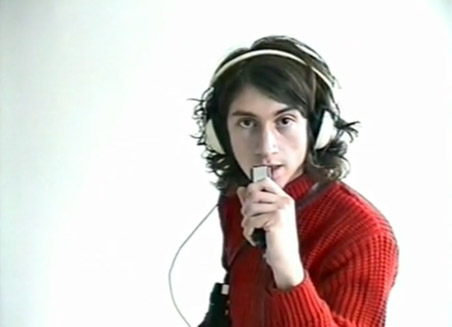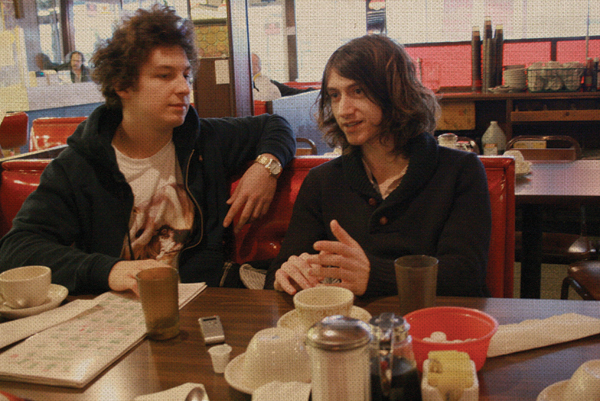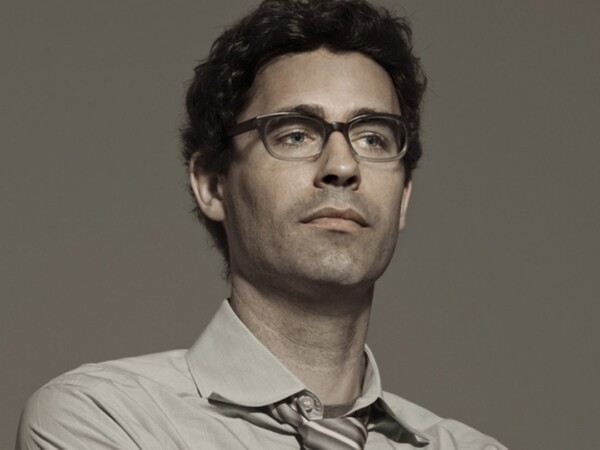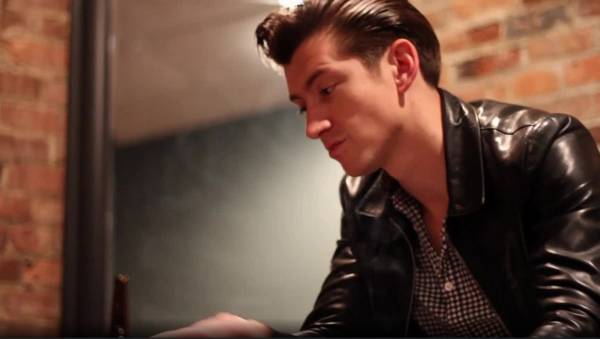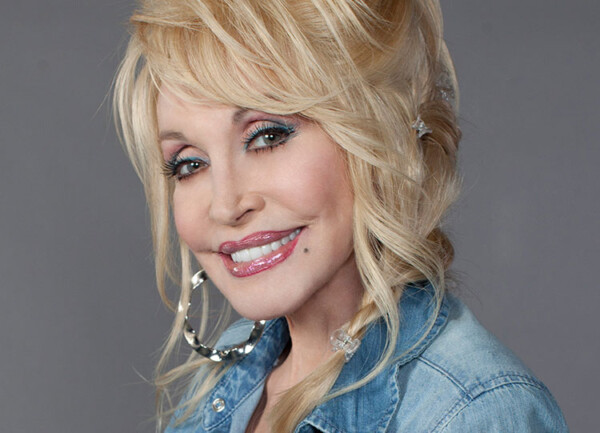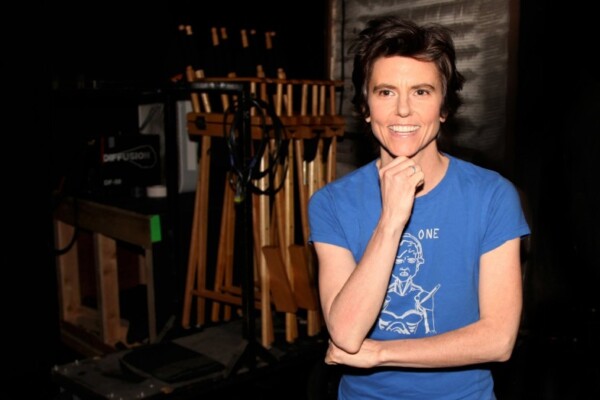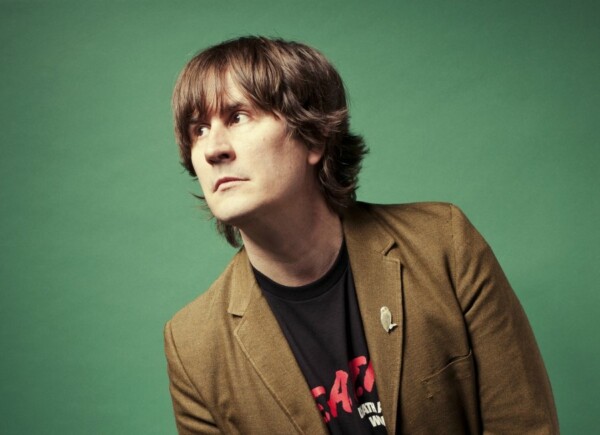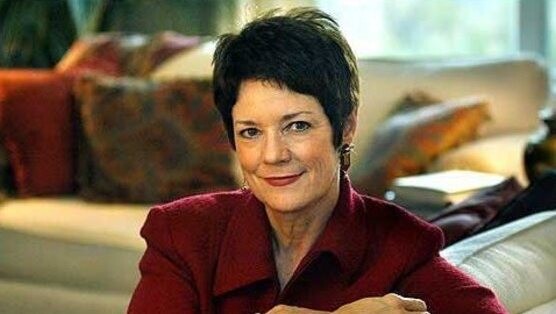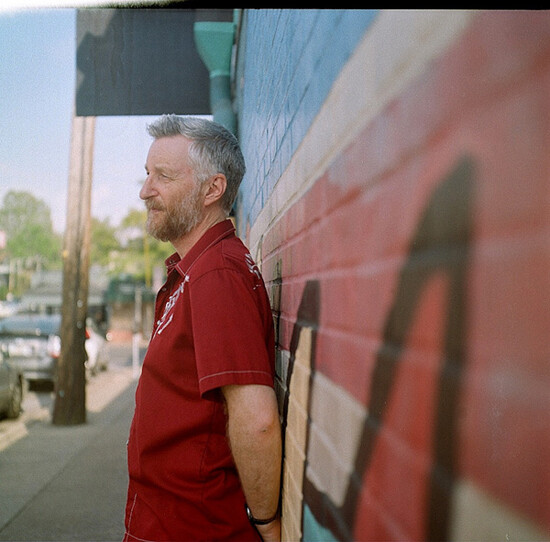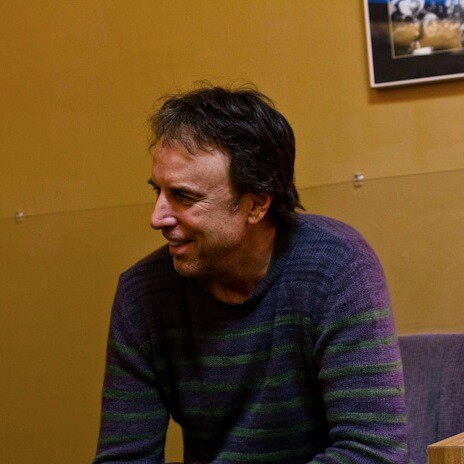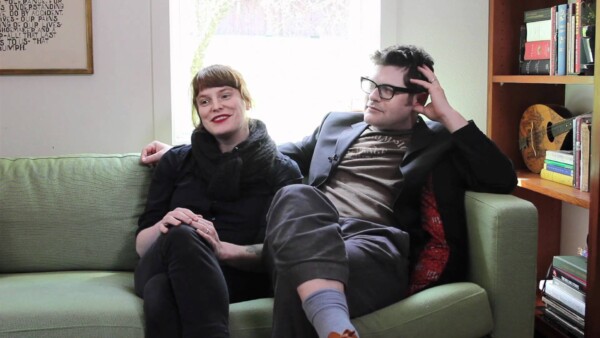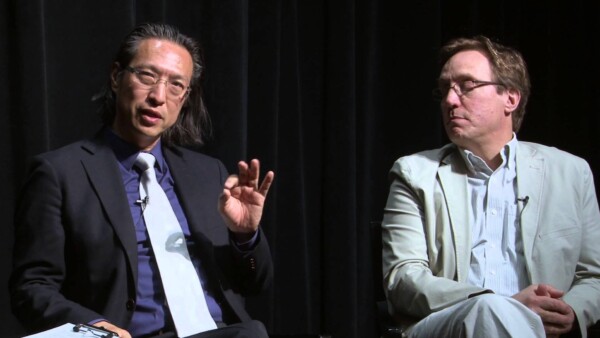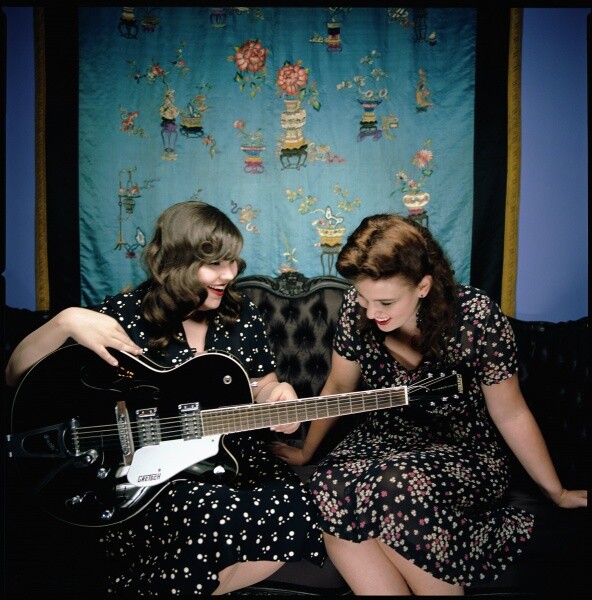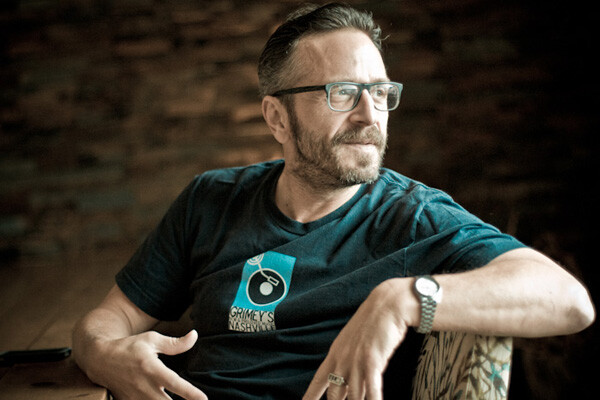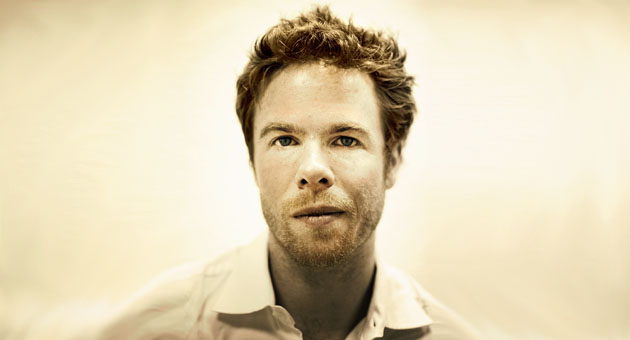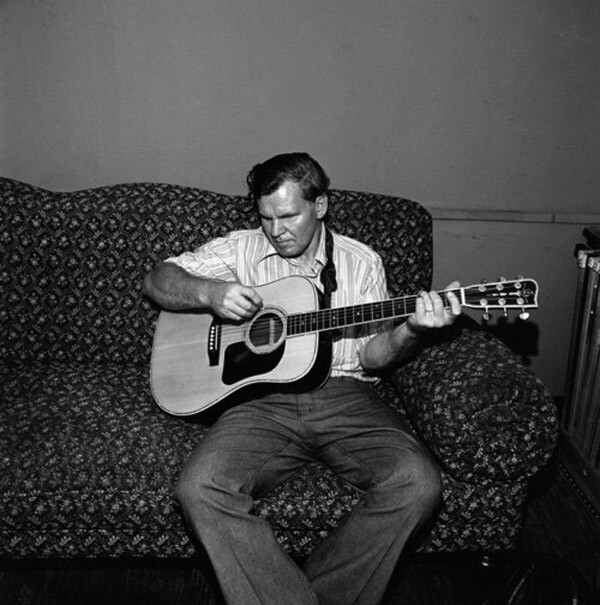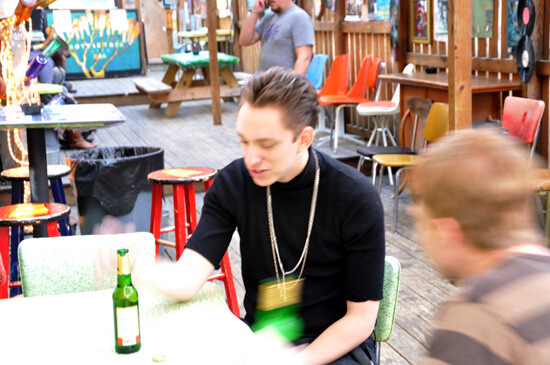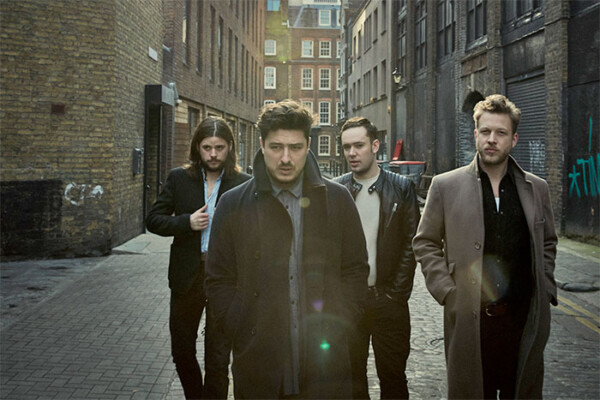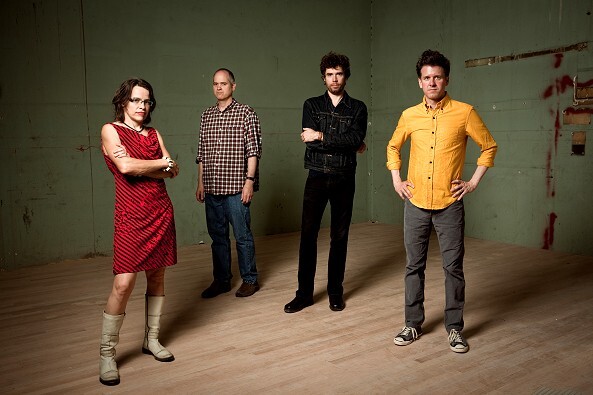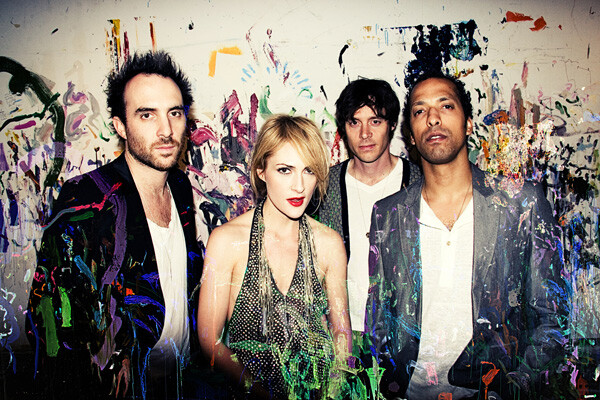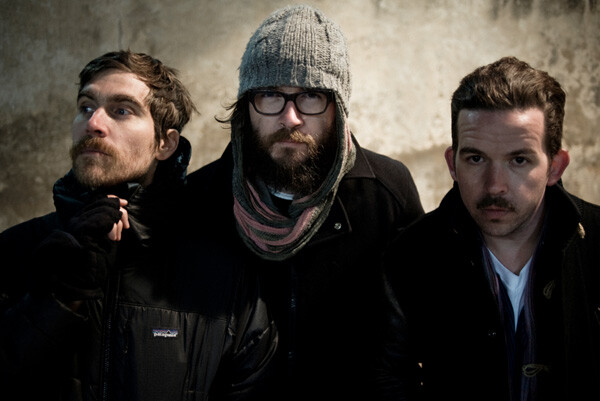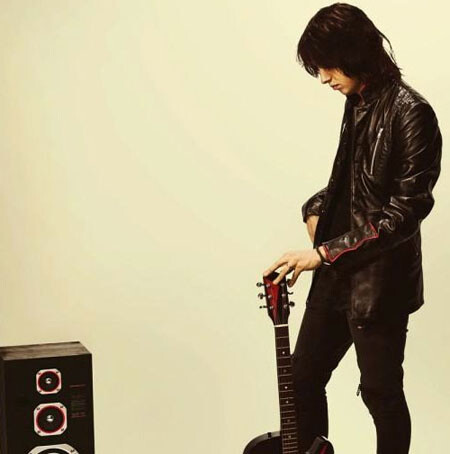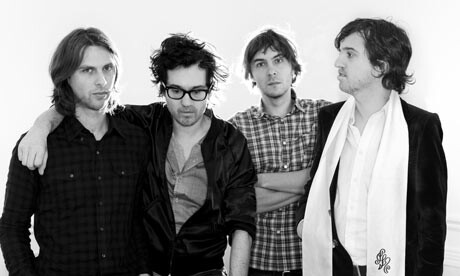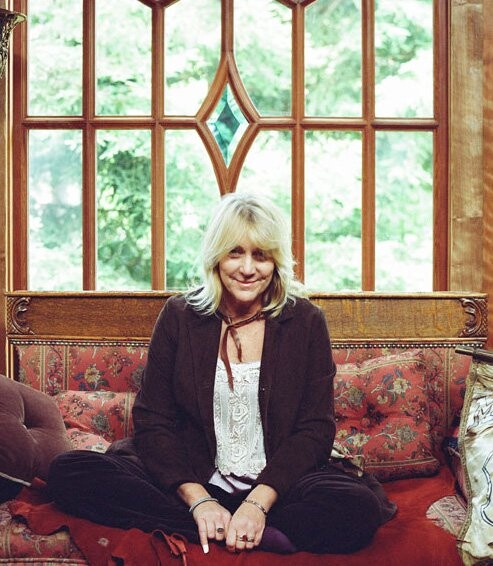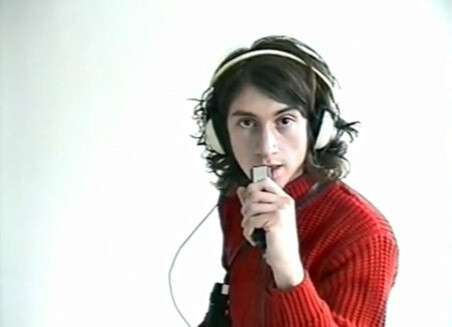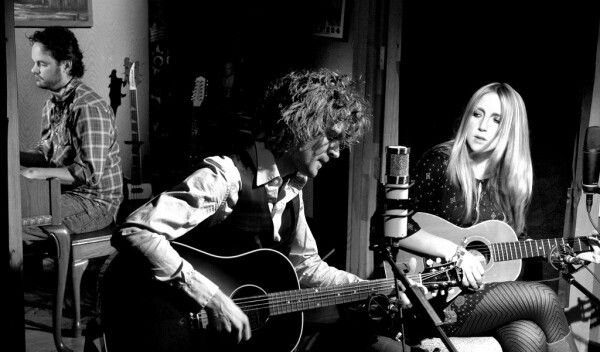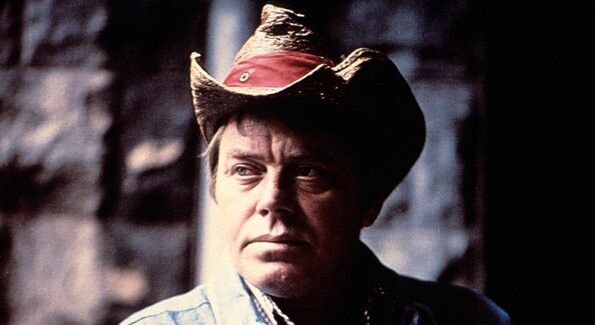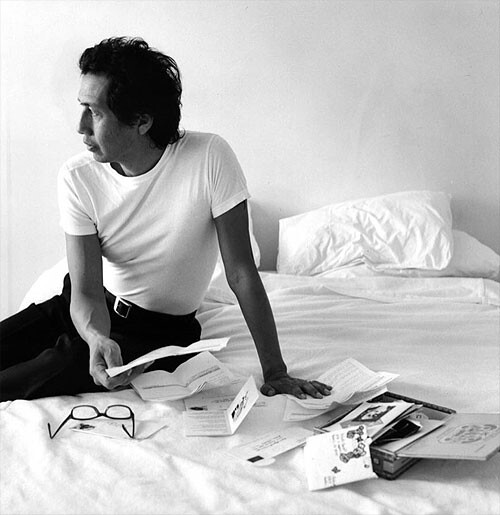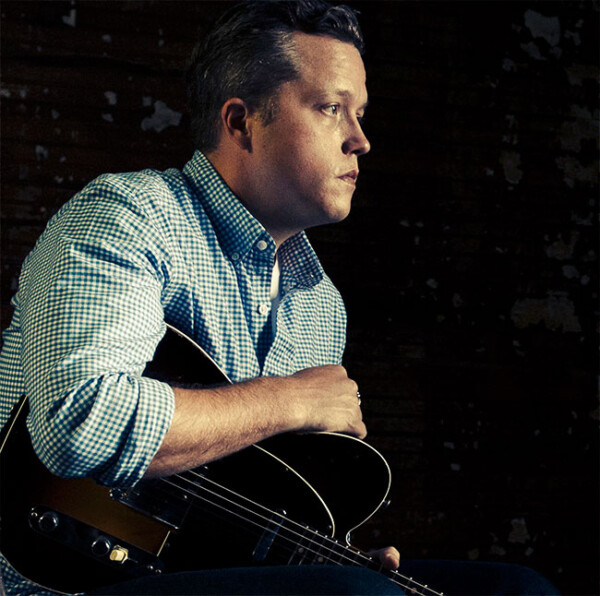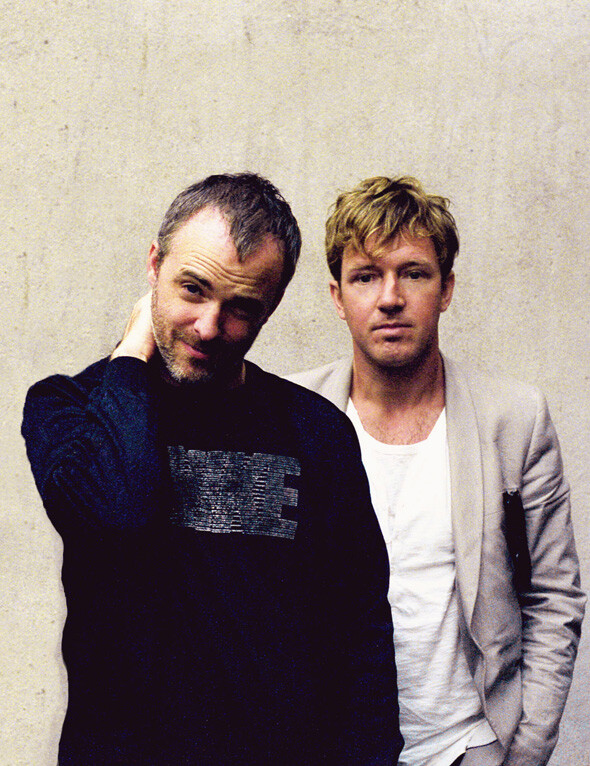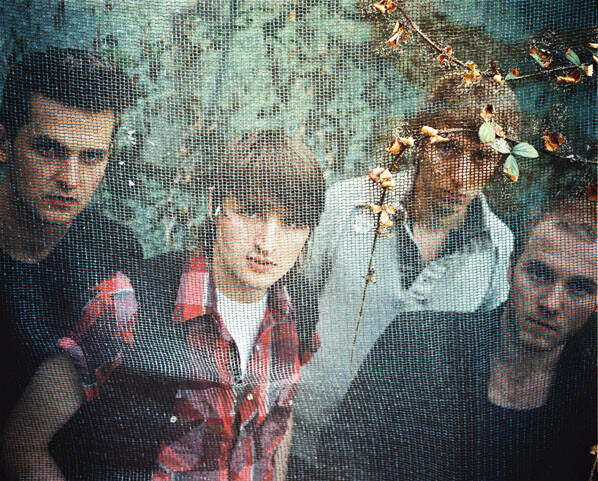Skip Matheny— currently a songwriter in the band Roman Candle and former bartender in a retirement community — caught up with Alex Turner and Matt Helders of the Arctic Monkeys before their show in Chicago, Illinois, last fall.
Online Exclusive: This is a full transcript of this text, which includes several questions and answers not available in the print edition of this interview.
![]()
What’s your favorite drink?
Alex Turner: There’s this Bourbon called Bulleit.
Wow yeah. That is really great stuff. I haven’t run into too many people that know it.
AT: Did you say you flew in from Nashville?
Well, we drove up actually.
AT: Yeah, I have probably driven more in America than I ever have in England really. This time last year I did the old PCH up the coast and then drove back to Joshua Tree as well. Somehow I feel like it is easier here or something. Maybe cause people don’t whine about it as much. [Laughs] ‘Cause things are so much more spaced out here.
photo credit: Timshel Matheny
Did you write these songs for the newer record after you had moved to Brooklyn?
AT: No. But I have written a lot since I’ve moved there.
A lot of writers have a newly infused life behind their writing once they leave their home country… it’s like they can write with an almost clearer eye about anything. Robert Frost, for example … his writing really took shape when he moved his family to the U.K. Have you experienced anything like that?
AT: Yeah. I think moving there seems to have given me like a kick up the arse or something. I mean I’ll sit there quite often, more frequently than I used to, and write. I feel like there is a lot more room here or something. But actually the songs on this record all came before [I moved]. But the next record probably will all be these songs I suppose.
Did either of you, have sometime when you were a kid when you heard a song and thought, “This thing or idea of a pop song, I get that. I might try to do that one day?â€
AT: Well, I remember I must have been like twelve years old or something, and hearing “I Am the Walrus†and thinking, “Well, this is just like nonsense. I could write something like this, surely.†And sort of attempting to write in that style and really struggling with it. I distinctly remember getting aggravated because it’s like, “Well, he’s singing about custard and a cob sitting on a cornflake and why can’t I think of that?â€[Laughs] And I still can’t do that exactly.
It reminds me of when I saw a Jackson Pollock painting as a kid and I thought, “Oh man, this guy has fooled everybody. This is some really easy stuff.†And then you get a little older and realize that there is something else going on there.
AT: Exactly. And there are other things: I remember being on car journeys with my parents and, I feel like that situation is the first time that I would hear music, as a kid. I suppose my Dad was talking to me about Beach Boys tunes and the harmony aspect of [their songs] as well. They evoke feeling from you—almost involuntarily—and the idea of that is something that’s stayed with me, because before the lyrics or anything in those songs, the chords and the vocal harmonies sort of get you. I remember being stirred even at a young age. It’s almost like you can’t help it.
Absolutely. How early did you start writing?
AT: Not properly for a while. When I’d hear the Beatles records, like Sgt. Pepper’s or whatever, I’d sort of try and write, but I didn’t know how to play an instrument. I had piano lessons a little bit, but I never got—off the white belt—you know what I mean? [Laughs] I could never sit down and figure anything out. But as soon as I got a guitar, I found you sort of get to that point quicker—where you can sit and make stuff up.
When you try to write lyrics do you imagine a song in terms of syllables and rhythm—like, “OK, I am going to hit these words or syllables in these places,†or do you think much about it? How much do you fit words to a melody?
AT: Well, I think that the melody is more the bit the struggle for me. I mean this guy (nods at Matt) has a really good sense of melody.
Matt Helders (drummer): I like a melody.
AT: He knows melodies and where harmonies are inside of melodies and…
MH: Sometimes I like a cheesy melody a bit. Quite often. It’s not bad though. Like r & b.
AT: Yeah but you’ll come up with alternate harmonies to exist in the songs…
MH: Yeah.
AT: I mean even when we are trying to cover a song and pick out the harmonies I find it hard to tune myself into that. I am still trying to work on that part. Some people are really good at it.
MH: Yeah , like (affects accent) Casablancas.
AT: Yeah. Like Julian Casablancas. He’s great at it. I mean there are great lyrics on those tunes too. But even on that new solo record, on that “11th Dimension†tune, the first thing that struck me about that is that there is the hook—and just when you are sort of getting your head around it he moves somewhere else. The way he just jumps around…
MH: It is like he has too many good ideas.
Yeah. That’s the thing I love about that solo record. It seems like he is getting a chance to pack all of these ideas into this one thing, and we get a chance to kind of see how his musical brain works a little bit more.
AT: Yeah. And I feel like that would be good for like their next thing now. In a way with those sort of melodies. Do you like The Strokes?
Very much so.
AT: I feel like writing lyrics is sort of different for each case, it seems. Sometimes, I’ll really have an idea for a tune, like a story or a format. Like with that song “Cornerstone,†I had this idea that I wanted each verse to be the same format and then you sort of know exactly where it is going, and the humor can get in there and it does that more narrative thing. Whereas, there are other songs where I’ll get excited about the sound of something phonetically and then build on it. You know like, “I wonder if I could get such and such a word in there?†Certain things just feel nice on the tongue.
You’ve managed to get the word “cuddle” into a couple of great rock and roll songs.
AT: Yeah, regrettably. [Laughs]
Oh no – it’s is well done I think, because it doesn’t sound out of place. When you’re writing, do you use any starting places for lyrical ideas like a scene from a film or a poem? Or do just shut off your TV or iPod and try to make a unique utterance?
AT: Yeah, I mean let’s say with that same song [“Cornerstoneâ€] there is this guy called Jake Thackray and he writes these sort of narrations that are kind of humorous. In some of his live recordings he will sort of pause so that people can laugh. There is this song of his called “Lah-Di-Dah,†and it’s about all the sort of nonsense he feels he is going through now that he has agreed with this girl that they’re in love and they’re going to be married. And it’s, “And now I’ll meet your auntie and stroke her cat, and talk to your Dad about the war.†In each verse he sort of starts the same way and describes a different angle of it. And that sort of stood out to me in the way that you are always right there with him. I guess that is sort of the opposite to something like “I Am the Walrus.†The way you completely understand [each detail] of what he is writing. It’s sometimes hard to do without being banal, I suppose.
It seems like sometimes in your songs there is a really clear narrative of what is happening—like in “Cornerstoneâ€â€”and then other times certain details might be really clear, but you are more turning your back to the audience on some of the main points, like “Crying Lightning.†It seems like there is this kind of interplay between, “I am laying it all out there for you†and then at other times, “I am laying half of it out there for you,†and the obscurity is what becomes interesting.
AT: I feel like there is a bit more of that as a device on this album for us—to still have a kind of a question mark when you are standing on stage playing. I feel like with these songs I almost wanted to kind of leave that [question mark] there a little bit so I could try and figure them out over the time we have been out playing. I mean, you still want to be the Walrus every now and again. [Laughs]
Yeah, it’s hard to do either one well, but it is rarer at the moment I think, to hear the crafted narrative-type song done well. When I first heard your first record, I wondered, “Who are these guys listening to?†Specifically any older writers, just for that reason. There’s an ear for stories in it. Did you listen to much older music?
AT: Definitely. Other than those things we mentioned from growing up—the Beach Boys or the Beatles or even like “Wall of Sound†things that my parents would always have on—I suppose that we started delving in and making our own tastes not long before when we did that first record. In terms of songwriters that I began to admire—Elvis Costello, the Kinks were two. I remember when we were recording that record, playing this tune—I think it is off of [Kinks] Face to Face called “It’s Too Much On My Mind.†It makes me laugh when I think about myself stewing over that as a 17 or 18-year-old. [Laughs] But yeah, we were lucky enough to have people in our lives that were turning us on to Elvis Costello and even The Smiths and others. Like the guy who taught me how to drive—I still have his Hatful of Hollow album. He lent me it. He was massively into that. I actually saw him the other week. We played in Sheffield and he came. His name is Carl and he taught all of us guys how to drive. He taught us to drive, but he really got us into the Smiths records. We’d spend more time talking about that then bloody three-point turns.
Man, that’s lucky. The guy who taught me how to drive was a Vietnam vet friend of my dad’s who had a half wooden leg. We were not talking about The Smiths. Was there ever a song or a particular artist you listened to that made you feel like you had a kind of secret—where you thought you might have understood the craft of what he was up to, more than a casual listener? I don’t mean in an — “I’m a superior listener sense,†–but in more of a “I’m hearing a bunch of subtleties here†sense.
AT: When we were at school I feel like “our thing†was this guy called Roots Manuva, this rapper. We used to be big into hip hop in school, and this guy Roots Manuva, and it was around his second album. He would tell tales, quite detailed, like he’d talk about smoking a spliff in his backyard and going out to the corner market; but he’d always have this kind of skewed perspective, probably from the spliff, but you know what I mean. He’d be describing his town but it would always be a bit countered. So I think maybe that was one of the first people like that for us. He is funny. We actually met him a few times. He ended up living not to far from where we grew up. I remember meeting him for the first time at this festival years ago and he happened to be on in the afternoon and we ran into him in the catering or whatever. And he was like, “Well, what’s the name of your band?†and we were like, “Well, the Arctic Monkeys, we just played a couple of hours ago.†He said, “There’s no monkeys in the Arctic.†[Laughing]
The other guy that had kind of an interesting spin, though the opposite, on our band name was [British poet] John Cooper Clarke. We ran into him and he really liked our band name. ‘Cause everyone used to think it was just the dumbest name, you know. I remember when we got a manager they were like, “Yeah, we really like what you do but the name just doesn’t make any sense, you know? There is no link to what you are singing about…†And for a minute even we were like, “We don’t know…†Then Johnny Clarke says [affects thick Lancashire accent] “Oh, I love that band name! It’s just a picture of trauma, you know? There’s this monkey…â€
MH: “And there’s no trees for him to climb…â€
AT: “His hands are too cold to peel his banana.†[Laughing] And we were like, “Great.†It’s interesting though, that name makes more sense to us now. I feel like we have grown into it. Now it sort of seems like we’ve either fucked it up or filled it up, I don’t know.
Kind of like naming a child and they may not look like their name, but they grow into it. There’s a great story from when Picasso painted that portrait of Gertrude Stein – and a friend of his said, “But it doesn’t look anything like her.†Picasso replied, “Oh, but it will.†[Laughing] Naming a band is a tricky thing. I have a few names I’d like to run past John Cooper Clarke.
AT: My girlfriend said that she wants to have a band named “Cardboard Keyboard”. [laughs]
If your hand was forced and you had to cover a Madonna song tonight, what would it be?
MH: Maybe a brand new one of hers would be funny, or the one off of Austin Powers. What is it? “Beautiful Stranger?†[Laughs]
AT: I thought of the one with the leotard, or [sings] “Holiday.â€
We have this thing in all of the “Drinks With†interviews where I mention a few more mainstream songwriters, and ask what the first thing that comes to mind is—so I’m going to mention a few folks and if you can say whatever comes to mind even if it’s a fried egg:
Joni Mitchell.
AT: My mother had Blue. I remember seeing that record lying around.
Bruce Springsteen.
AT: Born to Run. He was in Glastonbury last year. Feel like I saw a lot of him last year. We saw him actually. Our moms did at…
MH: He was staying at the hotel next to us in Vienna and our moms were there. There were hundreds of people outside his hotel. They saw him sneak out the back and get in a taxi and nobody noticed, just on his own. And our moms were like, “We just saw him! We saw Bruce Springsteen!â€
Noel Gallagher.
AT and MH in unison: “Don’t Look Back in Anger.â€
Do you listen to any older writers like Cole Porter? There is a cleverness in his songs, phrasing and rhymes, that reminds me some of the writing on you all’s records.
AT: My Dad had a Frank Sinatra cassette that he would play on car journeys. It was the Nelson Riddle arrangement of “I’ve Got You Under My Skin.†I remember the part where my Dad would always punch my knee was when Frank says [Imitates Frank’s voice] “Run for cover, run and hide.†I did hear that cassette quite a bit on car journeys actually, [sings] “They put coffee in the coffee in Brazil. You date a girl and find out later she smells just like a percolator…†[Laughs] Our guitar tech turned me onto a load of that a couple of years ago. Chet Baker does a lot of those tunes.
AT: Do you like country music?
Yeah—some kinds of it way more than others.
AT: I’ve always avoided it [pauses and smiles] naturally. But I heard this song recently, by George Jones, I think, called “Relief is Just a Swallow Away†[sings] “Well I’ve been blue before and I will again, I’ll drown all my worries or I’ll teach ‘em how to swim, And I won’t be the one to pay because relief—Is just a swallow away…â€
That’s a great song. They play it at a particular club in Nashville occasionally between sets.
AT: It’s interesting to me because I know I’ll never make a country record…
Are you sure?
MH: [Laughs] It could be [deepens voice] “The record he was never going to make…â€
AT: [Laughs] Yeah right. This is what I’m doing now. Are you on or are you off? — But at the moment it feels like, since I don’t think I’ll ever make anything that ever even sounds country, I can listen to those songs in a kind of distant or odd way. It’s interesting.
Thanks very much. Sorry we weren’t able to actually find a drink*.
AT: Maybe we can get one in a bit.
* (Skip’s note) Because of security etc. at the show that evening, we had to find a place to chat that had an accessible back door from the theater. There’s a great and odd diner directly left of the Riviera Theatre in Chicago. No drinks available, but a few senior citizens and some plants in the windowsill with aluminum foil covering the pots. After we had chatted for a while a few of the patrons picked up on the fact that Matt + Alex were being interviewed for something. When we got up to leave, I went back in for my jacket and was approached by an older man with a long, silver pony-tail. He was a professional native-american flute player, and asked that I pass his info along to the gentlemen in the interview. Naturally I did, but maybe more importantly, I still have his card if anyone is in the chicago area and looking.

